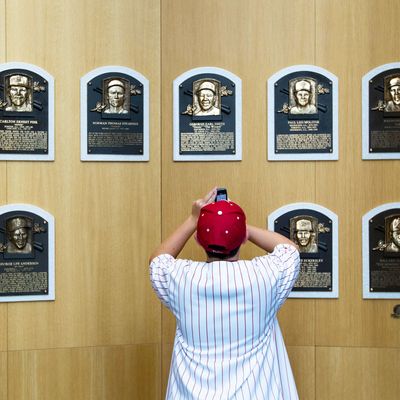
For ten long years, Roger Clemens and Barry Bonds loomed over the electoral process that determines who gets inducted into the Baseball Hall of Fame. The annual debates over who belongs in Cooperstown have always been fierce. But until recently, those arguments had almost always focused on a player’s on-field credentials — like whether Don Mattingly’s career had been long enough or if Tim Raines’s ability to get on base was really that valuable.
Bonds and Clemens occupied a peculiar no-man’s-land. Unlike stars such as Mark McGwire or Sammy Sosa, their cases for induction into the Hall were unquestionable; one could slice and dice their careers to surgically remove any season that carried the slightest whiff of scandal and they’d still be first-ballot Hall of Famers. So should they be punished for their sins, or should the major institutional failures of the steroid era serve as some form of excuse? These are profound questions that belong as much to the field of philosophy as that of sabermetrics. Soon the debate over the two stars’ candidacies became dreary, grinding, and repetitive. Year after year, Bonds and Clemens failed to garner enough support from the baseball writers who comprise the Hall of Fame’s electorate to make it into Cooperstown. Finally, after their decade of eligibility expired last year, they vanished from this year’s ballot. With them out of the way (along with Curt Schilling, whose social-media presence has been as problematic for his legacy as his split-finger fastball was to hitters), it was a chance for the baseball writers to reset things.
Baseball fans got to see the new normal in action this week. On Tuesday, the results of the 2023 Hall of Fame election were announced with just one player making the cut: Scott Rolen. The third baseman, probably best known for his time on the St. Louis Cardinals, cleared the 75 percent threshold by a mere five votes, and the debate over whether he deserved the prize came fast and furious. The arguments weren’t about steroid use (he’s never been accused of using them), nor were they about his morals or anything that weighty. Instead, the jockeying had a reassuringly pre-PED quality, centering around the question of whether he’s really a baseball immortal or simply very good. Fans and sports personalities bickered over his career numbers and the value of the traditional baseball statistics that have been used since the 19th century versus the advanced stats that now dominate the game. These were the kinds of disagreements familiar from the candidacy of another long-snubbed third baseman, Ron Santo, who retired from the game during the Nixon administration. And next year, another third baseman untouched by scandal, Adrián Beltré, should be inducted easily.
On one hand, this feels like a refreshing return to the pre–steroid era, back to some level of ordinary. On the other, the debate over performance-enhancing drugs hasn’t gone away. Alex Rodriguez, whose only competition for greatest shortstop in history led the league in batting during the McKinley administration, remains mired on the ballot, bearing the indelible stain of a multiyear suspension for steroid use. He’s not the only PED-era star left who’s up for consideration. And while Bonds and Clemens may have fallen off the ballot, they haven’t fallen off the face of the earth. Their candidacies will be periodically revisited by the Veterans Committee, an umbrella term for the groups that periodically revisit the candidacies of players passed over by the writers. Bonds and Clemens have already been up for review once and were rejected in favor of Fred McGriff, a clean-living slugger infamous for preferring to candy bars over weights. No one, even McGriff, would argue that he was a better hitter than Bonds or Rodriguez. But no one would argue McGriff was a cheater either.
This has left baseball fans in an awkward, uncertain place. It’s now almost possible to bypass the fraught subject of steroids and the Wild West period baseball experienced two decades ago. One can go back to bickering over old standbys, like how many Silver Slugger Awards cancel out an Iron Glove in the field, and some newer conundrums, like how Harold Baines, a perfectly fine player, was somehow considered good enough by a 2019 iteration of the Veterans Committee to get the nod.
But there is still something not quite right. As much as it is easy to pretend things are normal, Cooperstown is now a place where some of the greatest players in the game’s history are simply not there, as if they never existed. At a time when the national pastime is dwindling in cultural relevance, this hardly seems ideal.
There are no easy answers for how to reckon with the steroids era, but it’s clear that even without the most problematic players on the ballot, their legacy still lurks over the process. After all, those skeptical of Rolen’s credentials and seeking to have an old-fashioned baseball argument could point out that, even in his best season, he did not receive the Most Valuable Player Award — the winner that year was Bonds. Without any resolution, any clear and firm verdict over how to reckon with their careers, it leaves the stars of the steroids era as ghosts, haunting the earth and every debate about the sport’s history for the foreseeable future. Bonds and Clemens may be off the ballot, but the never-ending debate over their legacy will continue to seep through.





























